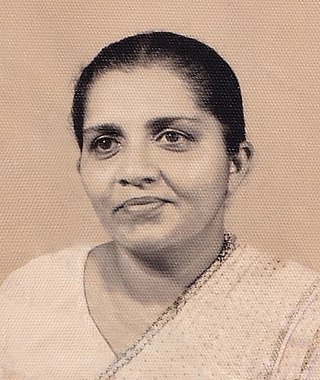Related Research Articles

Nanayakkarapathirage Martin Perera, commonly known as Dr. N. M. Perera, was one of the leaders of the Sri Lankan Trotskyist Lanka Sama Samaja Party (LSSP). He was the first Trotskyist to become a cabinet minister. He served two terms as Minister of Finance and Leader of the Opposition, as well as one term as the Mayor of Colombo.

Bolshevik–Leninist Party of India, Ceylon and Burma (BLPI) was a revolutionary Trotskyist party which campaigned for independence and socialism in South Asia. The party was formed in 1942 as a unification of two Indian groups, with the Lanka Sama Samaja Party of Ceylon. It was recognised as the Indian section of the Fourth International.

The Lanka Sama Samaja Party, often abbreviated as LSSP, is a major Trotskyist political party in Sri Lanka. It was the first political party in Sri Lanka, having been founded in 1935 by Leslie Goonewardene, N.M. Perera, Colvin R. de Silva, Philip Gunawardena and Robert Gunawardena. It currently is a member of the main ruling coalition in the government of Sri Lanka and is headed by Tissa Vitharana. The party was founded with Leninist ideals, and is classified as a party with socialist aims.
The Nava Sama Samaja Pakshaya is a Trotskyist political party in Sri Lanka. It was formed through the expulsion from the Lanka Sama Samaja Party (LSSP) of the Vama Samsamja tendency led by Dr Vickrambahu (Bahu), Sumanasiri Liyanage and some others. Siritunga Jayasuriya (Siri) and Vasudeva Nanayakkara (Vasu) joined later. In 1976 when the LSSP was thrown out of the coalition large numbers joined the tendency and in December 1977 it declared itself as Nava Sama Samaja Party.
The Hartal 1953 was a country-wide demonstration of civil disobedience and strike, commonly known as a hartal, held in Ceylon on 12 August 1953. It was organized to protest against the policies and actions of the incumbent United National Party government. It was the first mass political action in Ceylon and the first major social crisis after independence. This event is of historical significance because it was the first people's struggle against an elected government in the country.

Colvin Reginald de Silva was a Sri Lankan Cabinet Minister of Plantation Industries and Constitutional Affairs, prominent member of parliament, Trotskyist leader and lawyer in Sri Lanka. He was one of the founders of the Lanka Sama Samaja Party, the first Marxist party in Sri Lanka.

Violet Vivienne Goonewardene, commonly known as "Vivi", was a Sri Lankan anti-colonial activist and prominent politician, serving as one of the world's first female ministers. A key figure in both the Indian independence movement and the Sri Lankan independence movement, Goonewardene was a prominent member on the non-aligned stage, where she fought against perceived injustices and was critical of the Middle East diplomacy sponsored by the United States. Goonewardene was the first and, to date, only female National Hero of Sri Lanka. By her death, she was one of the Left's most vibrant personalities, and the foremost female figure in the Sri Lankan leftist movement.
During the Donoughmore period of political experimentation (1931–48), several Sri Lanka leftist parties were formed in British colonial Ceylon. Unlike most other Sri Lankan parties, these leftist parties were noncommunal in membership.

Edmund Peter Samarakkody was a Ceylonese lawyer, trade unionist, politician and Member of Parliament.
Bala Tampoe was a Sri Lankan lawyer and a trade unionist. He was the General Secretary of the Ceylon Mercantile, Industrial and General Workers Union (CMU) in Sri Lanka.

Mangala Nath Moonesinghe was a Sri Lankan lawyer and politician. He served as a Member of Parliament for Bulathsinhala electorate between 1965 and 1977, and the Kalutara electorate between 1989 and 1994. He was Sri Lankan High Commissioner to the United Kingdom from 2000 to 2002 and Sri Lankan High Commissioner to India from 1995 to 2000.
Ranawaka Arachchige Arthur Reginald Perera was Sri Lankan Trotskyist politician.

Leslie Simon Goonewardene was a prominent Sri Lankan statesman. He founded Sri Lanka's first political party, the Lanka Sama Samaja Party, in 1935, and served as its General-Secretary from 1935 to 1977. Goonewardene was a key figure in both the Indian independence movement and the Sri Lankan independence movement. He was designated as a National Hero of Sri Lanka for his leadership in the independence movement, and his efforts are celebrated each year on the Sri Lankan Independence Day.
Vaithianathan Karalasingham was a Ceylon Tamil lawyer, writer, politician and one of the leading members of the Lanka Sama Samaja Party.
Weerahennedige Theodore Wilfred Meryl Fernando was a Ceylonese teacher, trade unionist, politician and Member of Parliament.

Sebastian Cyril Constantine Anthony Pillai, also spelled S.C.C. Anthonypillai, was a Ceylonese-Indian trade unionist, politician and Member of Parliament.
Hugh Edmund Peter de Mel was a Ceylonese politician.
Soma Wickremanayake née Dharmawardhana was a Ceylonese educator and socialist politician.
Communism in Sri Lanka dates back to 1935, when the Lanka Sama Samaja Party was founded by Trotskyists who campaigned for freedom and independence of Sri Lanka which was then a colony of the British Empire and known as Ceylon.
References
- ↑ Leftists join the government, The Sunday Times, Retrieved 01 November 2015
- ↑ Fernando, Weerahennedige Theodor Wilfred Meryl (1923-2007), marxists.org, Retrieved 01 November 2015
- ↑ Meryl Fernando stood for working class - Prof Tissa Vitharana (Daily News), Retrieved 01 November 2015